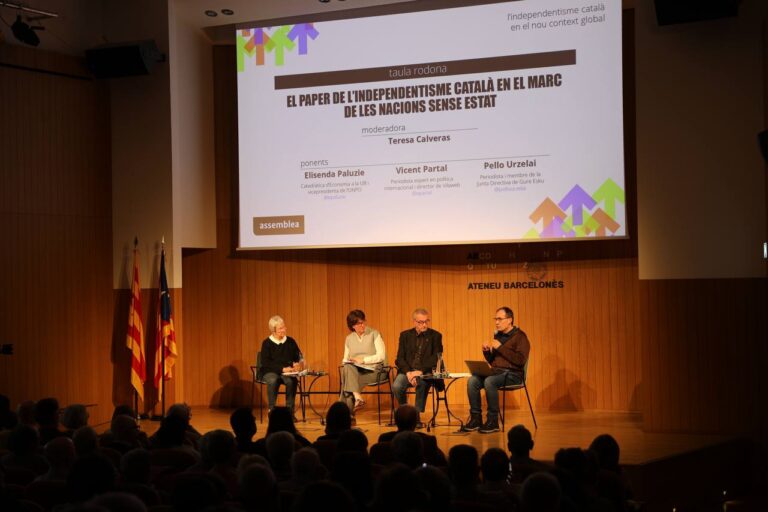
The Catalan National Assembly convened experts, scholars, and international observers at the Ateneu Barcelonès for the International Symposium “The Catalan Independence Movement in the New Global Context”, a full-day event dedicated to examining the future of stateless nations and the meaning of democracy in an increasingly authoritarian world.
Opening the symposium, the President of Assemblea Lluís Llach recalled the prophetic words of activist Julian Assange, who in 2017 predicted that Catalonia would set a precedent for democracy in the Western world. Llach described today’s global environment as one of “blatant regression,” urging Catalans to look back to the October 1st Referendum as a lasting democratic milestone.
A changing global landscape
Eight years after Spain’s brutal repression of Catalonia’s independence movement during the October 1st Referendum, the symposium offered a space for critical reflection on how self-determination movements can adapt to a world where authoritarianism is resurgent, force is normalised, and multilateral institutions weakened.
Speakers agreed that this context poses serious challenges for minority nations, whose demands for recognition are increasingly marginalised . Nonetheless, one should avoid falling into a “paralysing pessimism”, as Gure Esku representative Pello Urzelai noted, since stateless nations can represent a hopeful alternative grounded on human rights, dignity, solidarity and social justice.
Former Assemblea President and current UNPO Vice President Elisenda Paluzie emphasised that the right to self-determination is not an isolated claim but closely linked to civil and political rights such as freedom of expression, assembly and participation. She described it as both “an instrument to resolve conflicts” and an “antidote to imperialism and the far right.”
Political scientist Abel Riu noted that the independence movement must overcome past miscalculations and strengthen its international strategy by connecting Catalonia’s internal mobilisation with its diaspora abroad. “Independence cannot be defended without a clear national foundation,” he said, adding that national identity should be understood as a tool for inclusion, not exclusion.
Inclusive nationalism and global alliances
Political scientist Núria Franco discussed the role of immigration in stateless nations, noting that in Catalonia—as in Quebec and Scotland—it is seen as an opportunity for inclusion rather than a threat. However, she warned that integration policies will determine whether newcomers experience inclusion or marginalisation . Franco stressed that the structural grievances that fuelled the independence process—national recognition, fiscal imbalance, and the defence of the Catalan language and institutions—remain unresolved and will inevitably resurface.
Other speakers, including journalist Vicent Partal, highlighted the crisis of the Spanish state, as well as the new opportunities created by globalisation which increasingly value diversity over uniformity. “Independence movements come in waves,” Paluzie observed, calling for coordination and preparedness to seize the next historical moment.
International perspectives
The afternoon panels brought an international dimension, with contributions from John Packer (University of Ottawa), Timothy Waters (Indiana University), and Neus Torbisco (Geneva Graduate Institute).
Packer emphasised the importance of political will and creativity among stateless nations to manage aspects of sovereignty—such as language, culture, and economy—within existing global frameworks. Waters countered that gaining recognition requires strategic alliances and visibility on the geopolitical stage, while Torbisco defined self-determination as “the right to have rights,” warning that Spain’s constitutional limits render any notion of equality between Catalonia and the Spanish state illusory.
Throughout the symposium, participants shared the conviction that Catalonia’s democratic cause remains both a national struggle and a universal question about freedom, identity, and political legitimacy.
As Quica Sol, coordinator of Assemblea’s International Committee, concluded, “We must once again make Catalonia a precedent for democracy in the Western world.”
Find the conclusions here
Find the whole symposium here: https://www.youtube.com/watch?v=Bb7WoLdA5nY